A Tale of Two Chefs
Regarded as the most prestigious honor in the restaurant world, the James Beard Foundation has recognized two chefs working at the top of their game on opposite ends of the Flathead Valley
By Tristan Scott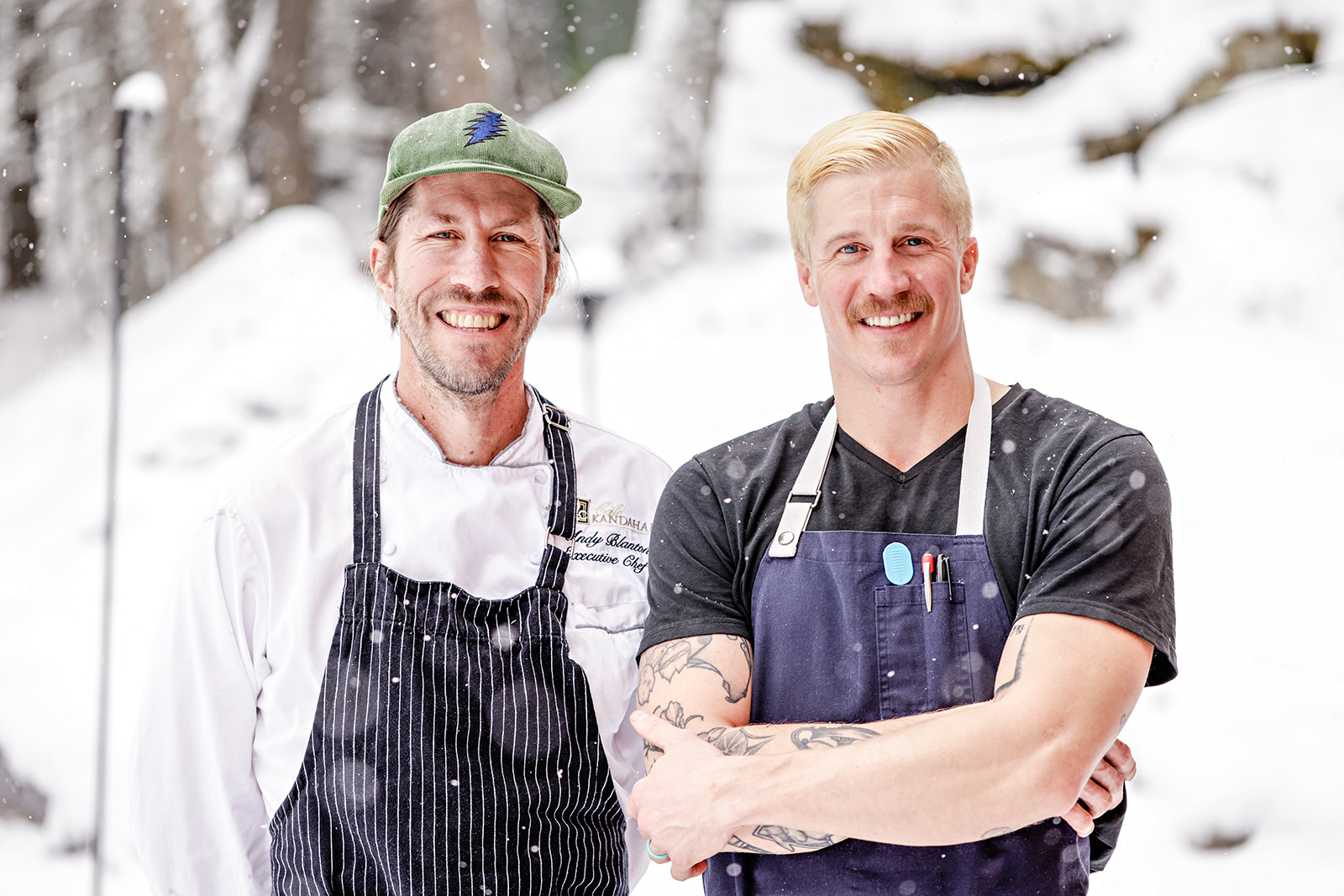
It’s the last day of January in northwest Montana, the end of an interminable month whose days brighten in degrees of gauzy gray, when they brighten at all. At Stonehill Kitchen and Bar in Bigfork, big lofty snowflakes are drifting past the gable windows, softening the edges of the outside world. But it’s warm and gleaming in the kitchen, where right angles and sharp spotless surfaces intersect at strategic junctures that a station chef can read like a table assignment.
It’s not yet 11 a.m. and, with the kitchen empty, Executive Chef Earl Reynolds is stooped over the stainless-steel counter, consumed with focus. He’s also celebrating. Sort of.
With surgical precision, Reynolds plates a new dish, one he’s considering featuring on his midwinter menu, which is an update to his winter menu that went online in December. Has it only been two months? It seems like a lifetime ago in culinary time.
Because winter in the Flathead Valley can span five months or more, Reynolds is rewriting roughly 80% of his program as a kind of seasonal seventh-inning stretch, giving his staff a short break and him an opportunity to recharge creatively while rebooting the menu. Meanwhile, the restaurant gets a deep scrub while Reynolds immerses himself in cooking literature, searching for inspiration to divine novel twists on classic cuisine.
That’s no easy task in the depths of winter when inspiration can be elusive. But this week’s been different.
On Jan. 25, the James Beard Foundation announced the semifinalists for its 2023 Restaurant and Chef Awards, which, alongside the Michelin guide and the World’s 50 Best Restaurants list, is regarded among the highest honors in the restaurant industry. For working chefs at the top of their game, it’s akin to earning an Oscar nomination, and Reynolds has just been named a semifinalist in the category for “Best Chef – Mountain,” which covers a five-state western region that includes Colorado, Idaho, Utah, Wyoming and Montana. A list of finalists for the prestigious awards will be released in March, followed by a June 5 announcement for the award winners.
He’s been riding high since learning of the nomination, to be sure, but that’s not why he’s celebrating.
Bent over the counter in silence, he’s tinkering with the presentation of a Foie Gras Torchon (French for “fat liver dish towel”). It’s a popular delicacy in French cuisine, even if some of its allure is lost in translation. “Foie gras” refers to the fatty liver of an overfed duck, while “torchon” refers to the tradition of wrapping the foie gras in a towel or cheese cloth, poaching it, and letting it steep or cure for several few days. The resulting cylindrical shape of foie gras torchon yields perfect, neat circles when sliced, and Reynolds is setting the luscious rounds over corresponding circles of brioche, which he tops with a pear chutney, vanilla parsnip puree, parsnip coils, graham cracker crumble, Hoshigaki-style persimmon slices (which Reynolds likens to Horiba gummy snacks), all of it crowned with diadems of lapsang souchong gel.
“Foie gras is controversial, and it sort of runs counter to the philosophy that drives a lot of my cooking, which is all about sustainable food systems and seasonal ingredients,” Reynolds acknowledges without glancing away from the composition of his dish. “But foie gras is also a recognition that we’re at the top of the food chain. It’s super decadent. It’s delicious. So, when I think of foie gras, I think of it as a celebration.”
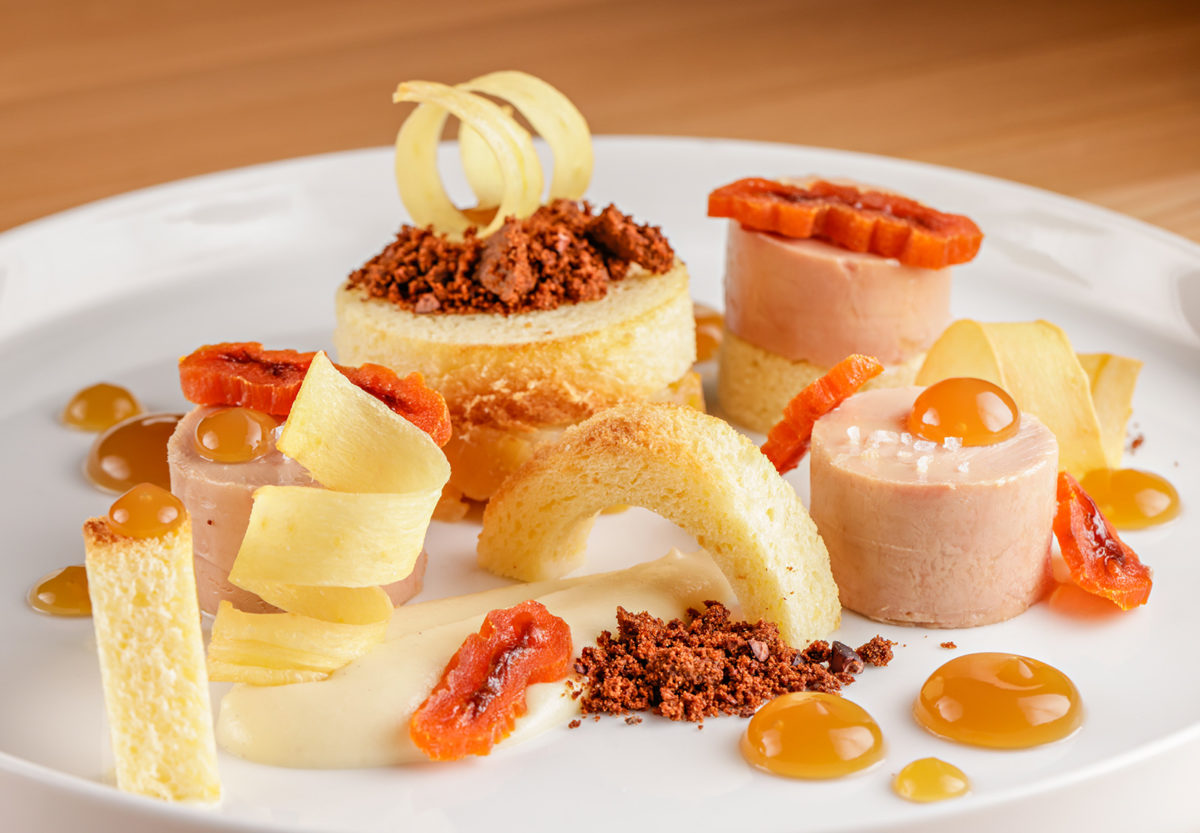
Personally and professionally, the chef has plenty to celebrate in the wake of the nomination, and although it also turns up the pressure on this next leg of the winter cooking season, Reynolds says he’s “here for it.”
“I do feel a little bit of added pressure, but I look at this more as an invitation to be totally and unabashedly me,” Reynolds said. “I got here by being true to myself, by playing with lots of fusion and fun flavor combinations. I like taking classic dishes and bridging the gap between different cultures and cuisines. I’m a mutt. It’s who I am.”
For that celebration to resonate with his guests, Reynolds is meticulous in its presentation.
“I always plate everything as if I’m the guest,” he said. “At this level it’s so important. A lot goes into the composition and if it’s not presented correctly, that breaks down. There’s never going to be any one correct way to eat my food, but there is a method and I do like to set my guests up for success.”
“I might have to put this on the menu,” Reynolds says finally, straightening his posture and looking down on a dish whose ingredients took days and weeks of patience to cultivate. “I don’t think we’re gonna be able to find room for the poached pear, though.”
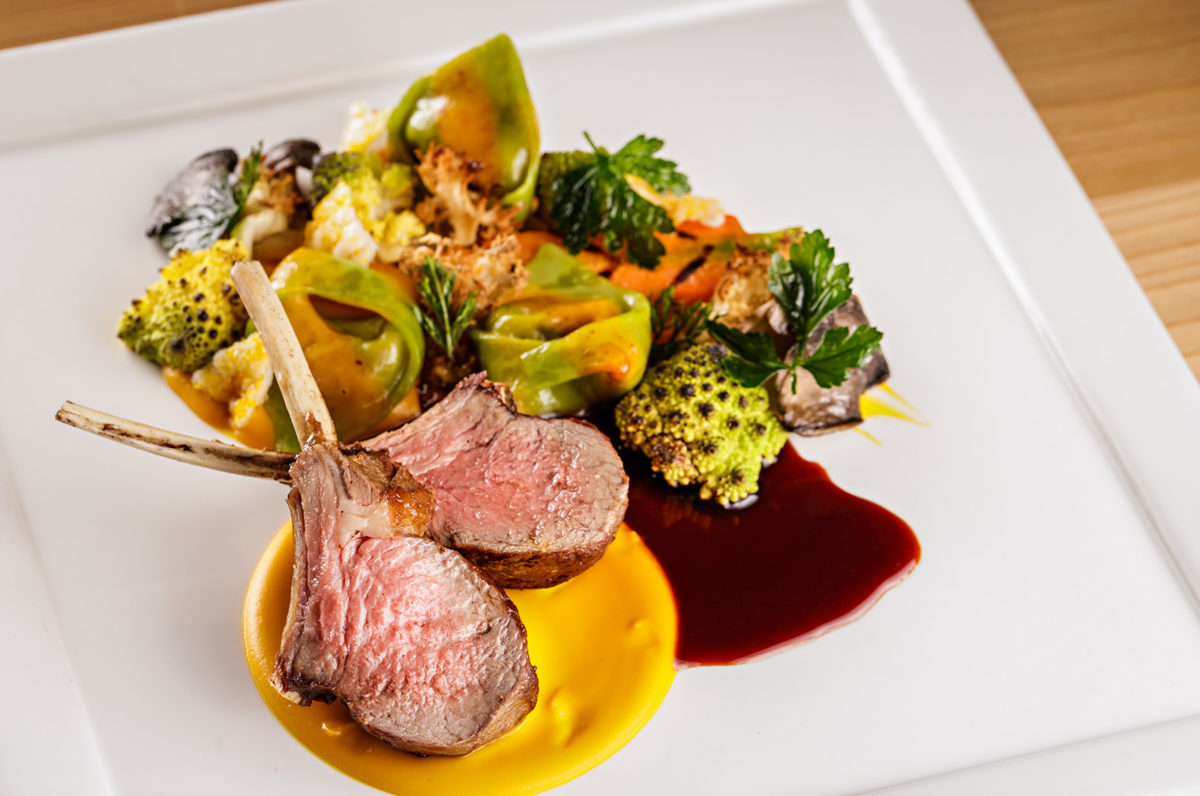
As Reynolds shifts his attention to the next dish — lamb rack paired with a bi-colored tortellini (the Whitefish-born cook employs saffron and parsley puree to dye the pasta dough gold and green, a nod to his high school Bulldogs) — a guest arrives at the door.
It’s Andy Blanton, the executive chef at Café Kandahar in Whitefish, where he’s helmed one of the region’s top fine-dining establishments for more than two decades.
“Congratulations, brother,” Blanton tells Reynolds as the two chefs exchange a hug.
There’s added meaning in the kudos coming from a fellow cook, especially one of Blanton’s caliber.
Since arriving at Kandahar in 2000 and purchasing the restaurant in 2006, Blanton has pushed its kitchen in brave new directions, accenting the tastes and textures of classic Montana fare with a bold and innovative flair derived from his traditional Louisiana roots and classical training. The cloistered restaurant at Whitefish Mountain Resort on Big Mountain is tucked into the quarter-century old Kandahar Lodge, a European-style inn where Blanton has been creating some of the finest and most pioneering food in Montana and the Pacific Northwest.
During a stunning run that began more than a decade ago, the quality of Blanton’s work was recognized by the James Beard Foundation on a perennial basis, earning him semifinalist nominations in the “Best Chef” category four times — in 2010, 2011, 2013, and 2014 — as well as an invitation-only trip in 2012 to the auspicious James Beard House in New York City’s Greenwich Village, a performance-under-pressure, concerto de cuisine for visiting chefs to showcase their creations and draw broad recognition from critics, peers and foodies from the most renowned corners of the culinary world.
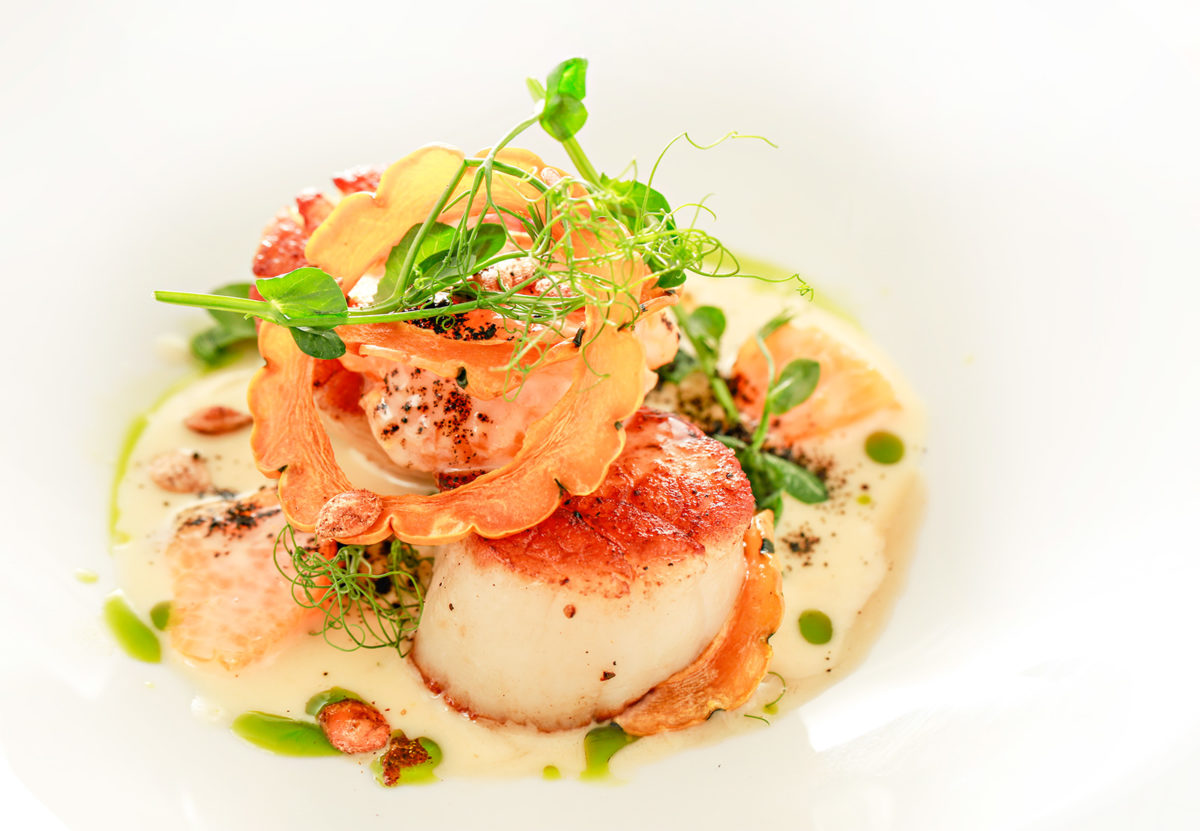
Cooking at the James Beard House is a rite of passage for distinguished chefs, and Blanton was the first Montana chef ever to receive an invitation or attend. The honor is particularly felicitous to Blanton because it is a longtime goal for the young chef, who trained under two of Louisiana’s premier cooks, both of whom were recognized by the James Beard Foundation.
It marked a shining moment in an illustrious career, one which has allowed Blanton to ply his craft at the most advanced level despite living in a remote corner of Montana, away from the gustatory epicenters of the coasts, where powder skiing and fly-fishing has helped him extend his longevity in a profession whose intensity is unmatched.
“Then we kind of fell off the map,” Blanton acknowledges, “which is funny because, if anything, we feel that our program has gotten more and more elevated through the years. So, this does feel like a validation of sorts, even though we don’t cook to be congratulated.”
The “this” to which Blanton’s referring is his fifth James Beard Foundation nomination as a semifinalist for Best Chef in the mountain region, an accolade he’s happy to share with Reynolds, and is hopeful they both advance to the next stage as finalists.
“Fingers crossed we make the finals,” Blanton says. “But this business is all about managing expectations, and you never know whose expectations are sitting in your dining room.”
Those expectations, and the often subjective nature of how they’re met, may have snakebit him in 2015, when a prominent food critic panned Kandahar’s elk strip loin as “tough to the point of inedibility” and, in doing so, marked the beginning an eight-year dry streak during which Blanton and Kandahar have received zero James Beard Foundation nominations.
But for the most part, Blanton seems unfazed, self-assured in his talent and ability and proud of his contributions to the community, particularly the ones he made during the COVID-19 pandemic, when he helped co-pilot a project through which local restaurants could donate prepared family-size meals to local food banks that were struggling to keep up with skyrocketing demands.
Just days after this year’s James Beard Foundation nominees were announced, Blanton attended the Whitefish Chamber of Commerce’s annual awards gala and accepted the “Tourism Business of the Year” award, which recognized Kandahar’s role facilitating the project.
“In the restaurant industry, we are masters of crisis,” Blanton said. “And this project helped. It helped us a little with self-preservation and it helped the community at a time of need.”
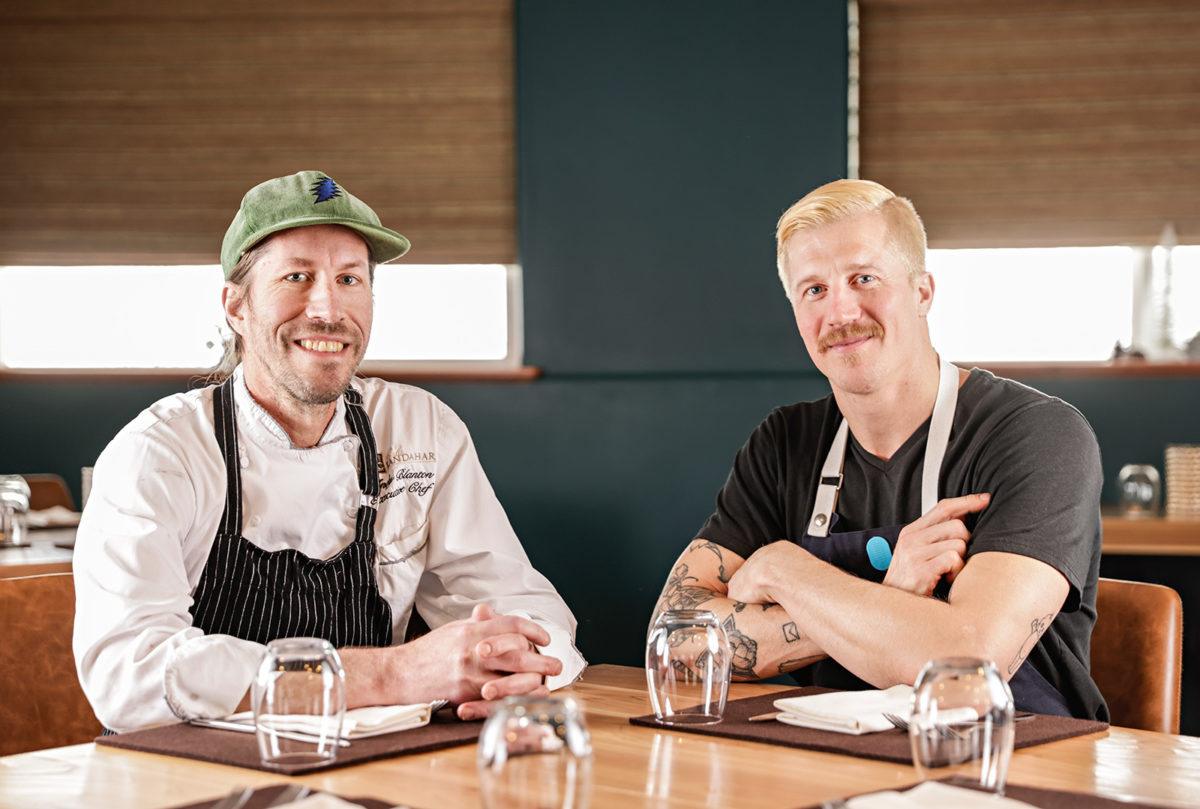
Having put the final touches on his lamb rack and tortellini, Reynolds joins Blanton and a guest in the dining room to discuss whether being named as a James Beard Foundation semifinalist will influence how he cooks in the coming weeks and months.
“It should be just another day in the office,” Reynolds says. “But there is that added intensity because the stakes are higher. If you forget to add that pinch of salt to a pan of boar ragu, the consequences are greater.”
It’s only now that Reynolds shares he was totally unprepared to receive the news of his nomination — news he received from Blanton, who texted his colleague from the kitchen at Kandahar, where Reynolds says he first dined in 2004 “after saving up all my money so I could take my girlfriend.”
“I was in shock when Andy texted me,” Reynolds says now. “I started shaking on my cutting board. I’ve dreamed of the James Beard Foundation since I started cooking seriously, so I really couldn’t believe it. I’ve been cooking for 19 years, and I’ve never received accolades like this. I even remember going to one of [Chef] Alan Wong’s restaurants in Hawaii and seeing the James Beard Foundation plaque on the wall. I thought, ‘I want to cook like that some day.’ But it’s a brutal industry and it’s a long road to get to join the top one-percent of chefs in the country.”
For Blanton’s part, it feels good to be back in the game, despite having never stopped playing. But in Montana, where top-level talent can be obscured by geographic remoteness, one key to success lies in commitment.
“This one feels different,” Blanton says. “I’d kind of begun to doubt my capacity and capabilities to hit that next gear. And then COVID sort of forced us to recreate our formula and strip it down to the essentials. We came out of Covid stronger than before. It taught us to quit trying to please the guests and be ourselves. I think we have the opportunity to blow people’s minds in part because they’re not expecting it.”
“It’s been a long road,” Reynolds says of his own culinary journey. “This industry is not for the faint of heart and I definitely feel that getting this nomination is like a pot of gold at the end of a f***ed up rainbow. All I can do is continue to cook with my soul and lead with my heart.”
To learn more about Chef Earl Reynolds and the Stone Hill Kitchen and Bar, visit the website here.
To learn more about Chef Andy Blanton and Cafe Kandahar, visit the website here.
To learn more about the James Beard Foundation Awards, visit the website here.